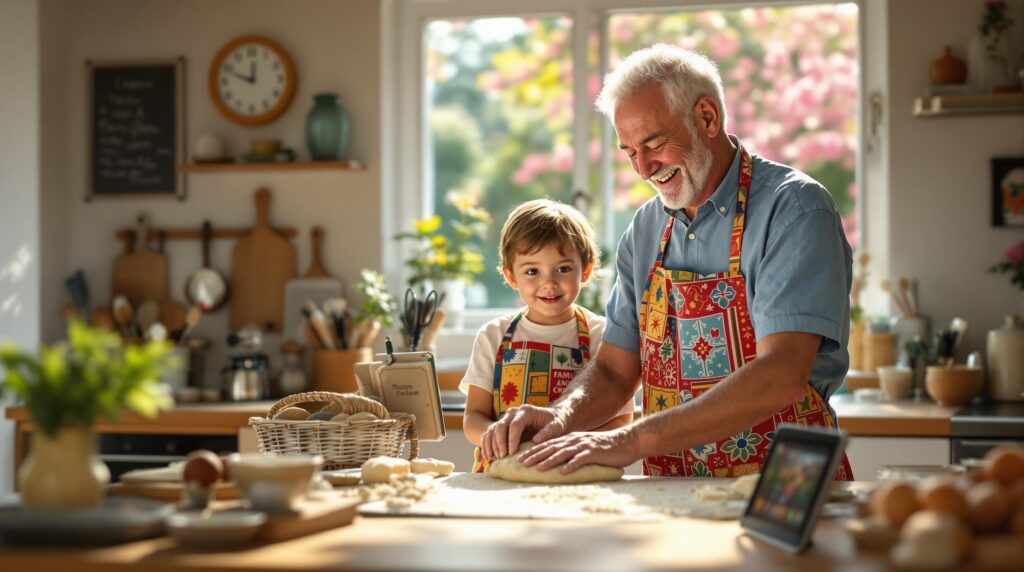Table of Contents
ToggleBecoming a grandparent for the first time is a life-changing experience filled with both challenges and joys. It’s a role that brings new responsibilities, emotions, and opportunities to shape the lives of the next generation. As a first-time grandparent, you’re embarking on a journey that will transform your family dynamics and create lasting memories.
The Transformative Role of Grandparents in Family Life
Grandparents play a crucial role in family life, offering a unique blend of love, wisdom, and support. They provide emotional stability, practical assistance, and serve as the keepers of family traditions. In fact, the impact of grandparents is so significant that in 2019, the U.S. Census Bureau reported 2.9 million grandparents were primary caregivers for their grandchildren.
The influence of grandparents extends far beyond occasional visits and holiday gatherings. They play a vital part in shaping the cognitive, social, and emotional development of their grandchildren. This influence can vary widely based on cultural norms, social circumstances, and economic factors.
As a first-time grandparent, you’re stepping into a role that can profoundly affect your grandchild’s life. You’ll have the opportunity to share your life experiences, values, and knowledge, creating a bridge between generations. This unique grandparent-grandchild relationship can foster a sense of family identity and continuity that’s invaluable in today’s fast-paced world.

Supporting Cognitive Development Through Interactive Activities
One of the most rewarding aspects of being a grandparent is the opportunity to support your grandchild’s cognitive development. By engaging in interactive activities, you can help stimulate their growing minds and foster a love for learning.
Consider tailoring your activities to match your grandchild’s developmental stage. For instance, during the sensorimotor stage (birth to 2 years), simple games like peek-a-boo can help develop object permanence. As they grow into the preoperational stage (2 to 7 years), symbolic play becomes crucial. You might set up a pretend grocery store or restaurant to enhance their cognitive skills.
Here are some ideas for cognitive-boosting activities:
- Storytelling: Share family stories or read books together. This not only enhances language skills but also strengthens your bond.
- Puzzles: Start with simple shape sorters for toddlers and progress to more complex jigsaw puzzles as they grow.
- Educational games: From memory games to board games, these can teach strategy, patience, and problem-solving skills.
- Nature walks: Explore the outdoors together, identifying plants, animals, and natural phenomena. This fosters curiosity and observational skills.
Remember, the key is to make these activities fun and engaging. Your enthusiasm can ignite a lifelong love for learning in your grandchild.
Fostering Emotional and Social Growth
As a grandparent, you have a unique opportunity to create a stable and loving environment that nurtures your grandchild’s emotional and social development. Your role as a consistent, caring figure in their life can have profound effects on their ability to form healthy relationships and manage emotions.
The NICHD Study found that high-quality caregiving by grandparents is associated with better social and emotional outcomes for children. Here’s how you can contribute to this growth:
- Model healthy emotional responses: Show your grandchild how to express feelings appropriately and cope with challenges.
- Provide emotional support: Be a safe haven where your grandchild can express their feelings without judgment.
- Organize family gatherings: These events allow your grandchild to interact with various family members, developing social skills.
- Encourage community involvement: Take your grandchild to local events or playgroups to broaden their social circle.
By consistently offering love, support, and guidance, you’re helping to lay the foundation for your grandchild’s emotional intelligence and social competence.
Maintaining Health and Well-being as a Grandparent
While focusing on your grandchild’s needs, it’s crucial not to neglect your own health and well-being. As we age, managing chronic conditions becomes increasingly important, especially when caring for young children.
The Centers for Disease Control and Prevention (CDC) emphasizes the importance of regular health check-ups, healthy eating, and physical activity for older adults. This is particularly vital as older adults are at higher risk for conditions like hypertension and diabetes.
Consider these strategies to maintain your health:
- Schedule regular check-ups with your healthcare provider.
- Stay active with your grandchild through walks, gentle exercises, or playground visits.
- Prepare nutritious meals that both you and your grandchild can enjoy together.
- Prioritize sleep and rest, especially if you’re providing frequent childcare.
- Practice stress-reduction techniques like meditation or deep breathing exercises.
Remember, taking care of yourself isn’t selfish – it’s necessary. By maintaining your health, you ensure you can be there for your grandchild for years to come.
Navigating Financial Challenges and Resources
Being a grandparent, especially if you’re taking on a significant caregiving role, can come with financial challenges. From childcare costs to educational expenses and healthcare, the financial burden can be substantial.
Fortunately, there are resources available to help grandparents navigate these financial waters:
- Temporary Assistance for Needy Families (TANF): This program can provide financial assistance to grandparents caring for grandchildren.
- Tax credits: Look into credits like the Child Tax Credit or the Credit for Other Dependents, which might apply to your situation.
- Financial counseling: Many non-profit organizations offer free financial counseling for seniors.
- Local support groups: These can provide valuable information about local resources and assistance programs.
It’s important to research and utilize these resources. Don’t hesitate to reach out to local senior centers or the U.S. Department of Health and Human Services for guidance on available financial assistance programs.
Understanding Legal Rights and Support Systems
Navigating the legal aspects of grandparenting can be complex, especially if you’re taking on a primary caregiving role. Understanding your rights and the available support systems is crucial.
Here are some key areas to consider:
- Custody and visitation rights: Laws vary by state, so it’s important to understand your specific situation.
- Guardianship: If you’re considering becoming a legal guardian, familiarize yourself with the process and implications.
- Power of attorney: This might be necessary for making medical or educational decisions for your grandchild.
The American Bar Association (ABA) offers resources specifically for grandparents seeking legal guidance. Additionally, many states have grandparent advocacy groups that can provide support and information about local laws and resources.
Remember, seeking legal advice early can help prevent complications down the road. Don’t hesitate to consult with a family law attorney to understand your rights and options.
Embracing Cultural Diversity in Grandparenting
Grandparenting roles can vary significantly across different cultures and societies. Embracing these differences can enrich your grandparenting experience and help your grandchild develop a strong sense of cultural identity.
Here are some ways to incorporate cultural elements into your grandparenting:
- Share traditional stories and folklore from your cultural background.
- Cook traditional meals together, explaining the significance of different ingredients or dishes.
- Teach your grandchild words or phrases in your native language, if applicable.
- Participate in cultural festivals or events together.
- Share family histories and traditions, helping your grandchild understand their roots.
By embracing cultural diversity, you’re not only preserving your family’s heritage but also helping your grandchild develop a broader worldview and appreciation for different cultures.
Building Strong Bonds with Grandchildren
Developing a strong relationship with your grandchild is one of the most rewarding aspects of being a grandparent. These bonds can have a lasting impact on both your lives, contributing to better emotional well-being and social skills for your grandchild.
Here are some strategies for building and maintaining strong connections:
- Regular communication: Whether through phone calls, video chats, or in-person visits, consistent contact is key.
- Shared activities: Find common interests and engage in activities you both enjoy.
- Create traditions: Establish special rituals or activities that are unique to your relationship.
- Be present: When you’re with your grandchild, give them your full attention.
- Show interest in their world: Ask about their friends, hobbies, and experiences.
Remember, building a strong bond takes time and effort. Be patient and consistent in your approach, and you’ll likely find that the relationship grows naturally over time.
Adapting to Modern Parenting Trends
Parenting practices have evolved significantly over the years, and as a grandparent, it’s important to stay informed about current trends and methods. This knowledge will help you support your grandchild’s parents without overstepping and ensure you’re providing care that aligns with their parenting philosophy.
Here are some ways to stay up-to-date:
- Read current parenting books or reputable online resources.
- Attend parenting workshops or seminars, many of which are now available online.
- Talk openly with your grandchild’s parents about their parenting approach and preferences.
- Be open to learning about and using new technologies that support child development.
The U.S. Department of Education offers resources for grandparents looking to support their grandchildren’s learning. Familiarizing yourself with these can help you play an active role in your grandchild’s education.
Remember, while it’s important to adapt to modern trends, your wisdom and experience are invaluable. The key is to find a balance between traditional wisdom and contemporary practices.
Conclusion
Becoming a first-time grandparent is a journey filled with both challenges and immense joy. It’s an opportunity to play a vital role in shaping a young life, to share your wisdom and love, and to experience the world anew through the eyes of your grandchild.
While the role comes with its share of responsibilities and potential hurdles, the rewards are immeasurable. By staying informed, maintaining open communication with your grandchild’s parents, and focusing on building strong, loving relationships, you can make the most of this precious role.
Remember, every grandparenting journey is unique. Embrace the challenges, celebrate the joys, and savor every moment of this special time in your life. Your love and presence can make a world of difference in your grandchild’s life, creating memories and bonds that will last a lifetime.
For those grandparenting from afar, remember that distance doesn’t have to diminish your impact. With creativity and effort, you can maintain a strong presence in your grandchild’s life, no matter where you are.
Sources:
Piaget’s Stages: 4 Stages of Cognitive Development & Theory
Evidence-based milestone ages as a framework for developmental surveillance
The NICHD Study of Early Child Care and Youth Development
U.S. Census Bureau: Grandparents as Caregivers
Reading to Children: Why It Matters
Centers for Disease Control and Prevention: Healthy Aging
U.S. Department of Health and Human Services: Temporary Assistance for Needy Families (TANF)
American Bar Association: Grandparents’ Rights
U.S. Department of Education: Supporting Grandparents as Caregivers











